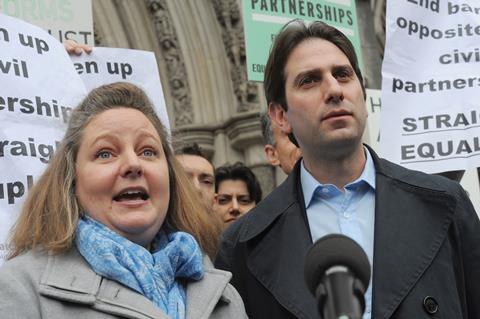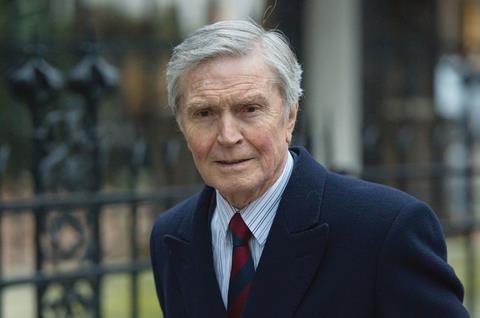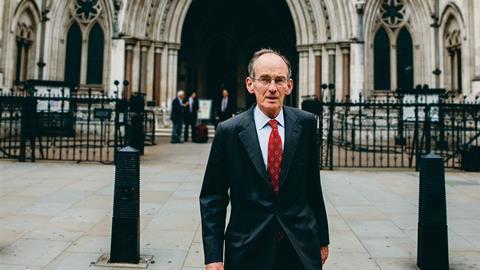Sir Andrew McFarlane, who succeeded Sir James Munby last week, is demonstrating plenty of empathy. But practitioners filled with trepidation about the future also detect steel in his leadership, reports Grania Langdon-Down.
THE LOW DOWN
Family practitioners have a list of issues they want the new president of the family division Sir Andrew McFarlane to tackle as he takes over a system in crisis. Care proceedings continue to increase, while mediations over child and financial arrangements have ‘fallen through the floor’ and increasing numbers of parents are going to court over contact disputes. Everyone from judges down warns that delays and lack of legal aid mean parents are losing contact with their children after separation or are left vulnerable financially. Pressure is growing for parliament to provide protections for cohabiting couples. McFarlane has made his concerns clear about the impact of the legal aid cuts, court closures and delays but he has a tightrope to walk between judicial independence and accusations of playing politics.
The new president of the family division Sir Andrew McFarlane takes up the mantle from the outspoken Sir James Munby, who highlighted five ‘burning issues’ requiring statutory reform: no-fault divorce; cohabitants’ property rights; ancillary relief; alleged perpetrators of domestic abuse being able to cross-examine alleged victims; and transparency.
Over recent weeks, McFarlane has set out in a series of speeches what he sees as the key challenges, including the ‘crisis’ in childcare proceedings and the damaging impact legal aid cuts are having on access to justice and morale across the family justice system.
For practitioners, his empathetic approach could not be more welcome. With his background as a legal aid childcare practitioner – and an outspoken critic of legal aid cuts while at the bar – McFarlane praised practitioners at the recent Legal Aid Lawyers Awards. ‘Without the lawyers, “access to rights” is an empty phrase,’ he said.
He is also determined to understand the realities of life in the family courts after seven years in the Court of Appeal.
Starting in the autumn, he is going to visit every full-time judge in each of the 40 or so designated family court centres, together with magistrates, local Children and Family Court Advisory and Support Service officers, and practitioners, to see how the private law programme is being experienced so he can ‘understand what goes well and, no doubt, what does not and what may need to be changed’.
Practitioners have a lengthy checklist of issues they would like him to address. Graeme Fraser, family partner with OGR Stock Denton, says delays are undermining family reform and raising human rights issues, as they are preventing separating couples from moving on with their lives. (Official statistics for January to March 2018 show, for example, that the average time from petition to decree nisi was 27 weeks – up three weeks on the same quarter in 2017 – while the average time from petition to decree absolute reached a new peak of nearly 52 weeks.) Fraser welcomes the president’s plan to visit the courts, but says he should make some unannounced visits and try contacting a court about a case.
‘I went to my local court to raise a query at the counter,’ he says. ‘I was refused entry by security staff, who gave me a piece of paper with three telephone numbers: one was dead, one was permanently engaged, and when the third was finally answered, I was told I couldn’t speak to anyone.’
Jo Edwards, head of family at Forsters, was so frustrated by delays affecting a mediation client she tweeted HM Courts & Tribunals Service (HMCTS) to get a response.
The courts service tweeted back: ‘Hi Jo, we’re sorry for the impact of the delays & are working hard to address these & improve the current level of service across our centres. We’re recruiting extra staff, moving workloads between centres & drafting in additional resources to reduce delays wherever possible.’
Based in Exeter, Penny Scott, chair of the Law Society’s Family Law Committee, says ‘there is a huge disconnect between people’s lives and the demands of a system which is not coping’.

McFarlane’s visits come against the backdrop of last week’s scathing Public Accounts Committee report on HMCTS’s ‘unprecedented’ £1.2bn programme to modernise the courts. MPs said this is being pushed through without proper regard for its impact on access to justice.
One area of the reform programme praised by both judges and practitioners is the online system for submitting uncontested divorce petitions, which has led to rejection rates being cut from 40% to 0.5%. Piloted with separating couples, this will be available for solicitors to use later in the year.
Margaret Heathcote, chair of Resolution, says she was ‘pleasantly surprised’ by the latest iteration of the system. She also believes that it will militate in favour of no-fault divorce, because it will be administratively easier to have that as either an option or the default position.
While divorce reform, extending civil partnerships to opposite-sex couples and cohabitation protections are for parliament, judges have been increasingly outspoken in cases such as Owens v Owens suggesting the law is failing to keep up with modern family life. Successive governments have shown no appetite for divorce reform but the Ministry of Justice is now making sympathetic noises about the need for change.
Justice secretary David Gauke is expected to work with colleagues across the parties on the private member’s bill being put forward by Baroness Butler-Sloss, a former family division president. This proposes a system of no-fault divorce after a nine-month cooling off period.
Nigel Shepherd, past chair of Resolution, says the current system encourages mudslinging. ‘We need to end the blame game,’ he stresses.
In the landmark Steinfeld and Keidan decision in June 2017, the Supreme Court ruled that the government’s failure to open civil partnerships to opposite-sex couples was discriminatory. But any legislative proposals are unlikely to be imminent given a parliamentary schedule crowded with Brexit-related matters. However, this still leaves open the question of formal protections for cohabiting couples. Extending civil partnerships will not of itself remedy the situation, says Fraser, chair of Resolution’s cohabitation committee, because many do not want their relationship regulated by the state.
A YEAR IN THE FAMILY COURTS
2018 has seen key cases involving the highly charged areas of divorce, child care arrangements and financial remedies.
Owens v Owens – The Supreme Court decision in the ‘most significant divorce case of the century’ that centred on Hugh
Owens’ (pictured) refusal to end his marriage to Tini Owens has renewed pressure on the government to reform ‘outdated’ family law.

Re J (Children) – Sitting in the Court of Appeal, Lord Justice McFarlane said unjustifiable delays in the lower courts meant it was too late, in the interests of the children of the family, for any investigation into claims and counterclaims going back six years.
Mills v Mills – The Supreme Court decided unanimously that a woman who spent all her settlement money cannot claim more from her former husband.
Hart v Hart – A High Court judge’s decision to jail an 83-year-old property developer in poor health for 14 months for contempt of court shows the courts are prepared to order the ultimate sanction where there has been systemic and repeated breaches of court orders made in financial remedy proceedings.
The other big political hot potato is legal aid. McFarlane told the Bloomsbury Family Law conference in May that he wanted to put on record his concerns about the impact of the legal aid cuts. These included attracting young and talented lawyers into publicly funded family work; the disappearance of experts; and judicial recruitment and morale, which he saw as one of the ‘most pressing challenges’.
Official statistics for January to March 2018 show family legal help starts decreased by 13% compared with the same quarter in 2017. In family mediation, Mediation Information and Assessment Meetings (MIAMs) were down by 19% (around a third of pre-LASPO levels) and mediation starts down by 18% (just under half of pre-LASPO levels).
Select committee chair Bob Neill said recently that mediation had ‘fallen through the floor’ following LASPO and there was a ‘very strong case’ that reinvestment in early legal advice through legal aid would save money and alleviate social damage. The MoJ has been promising an evidence-based review of part 1 of LASPO, including the provision of legal aid for early advice, but timing has slipped.
With little prospect of legal aid being restored to pre-LASPO levels, practitioners say there are practical steps the president can take to ensure judges comply with the Family Procedure Rules to consider non-court dispute resolution at every stage.
Family lawyer and arbitrator Tony Roe says the rules are more likely to be breached than observed, and McFarlane should encourage judges to be much more proactive.
Alison Bull, Mills & Reeve family partner, drafted a suite of documents to support a 12-month pilot being run by the Manchester Family Court MIAM referral scheme to encourage separating parents and other carers to try mediation to agree child arrangements. ‘Where the president could have a big impact,’ says Bull, ‘is to press for money to be allocated from the court modernisation budget to incorporate a web-based interface between clients and mediators on the Family Mediation Council website, so that bookings for MIAMs can be made immediately while at court.’
This should be supported by a web-based public funding eligibility tool for family mediation as awareness that MIAMs are free for both parties, where one is eligible, is low, she adds.
Bull says there is a misunderstanding that domestic abuse is required before clients will be eligible – but that requirement applies only for legal advice outside mediation.
Heathcote, consultant solicitor with Bishop & Sewell’s family and divorce team, says the government thought mediation was the ‘magic bullet’ that would take private family law issues out of court and save money. But without signposting from solicitors, she adds, the public perception is that people are being denied their traditional route to court in favour of a second-class, less official, model.
While mediations plummet, increasing numbers of parents are going to court to settle disputes over contact. There were more than 138,500 child arrangement orders last year, up 5% and 8% over 2016 and 2015.
Applications for civil representation supported by evidence of domestic or child abuse increased by 21% in January to March 2018, compared with the same period in 2017. The number of applications granted also increased (up 14%). These are the highest quarterly figures since restrictions were lifted earlier this year.
McFarlane has raised his concerns over intractable cases, citing four recent decisions where courts put off early intervention and failed to undertake a fact-finding process, with the result that views became entrenched and children lost contact with the absent parent.
But he is careful to be even-handed in his approach to issues around domestic abuse and parental alienation. He told a recent Families Need Fathers (FNF) conference that he plans to consult with the judiciary over standing temporary orders based on the norms for the age of the child, in order to maintain some contact in the interim stages. But he also used his speech to raise awareness of the Women’s Aid report What about my right not to be abused?, which he said should be ‘required reading’ for FNF members.
Legal aid cuts have had repercussions across family hearings.
Zoë Fleetwood, partner and solicitor-advocate with Dawson Cornwell, says the government promise that there would be exceptional funding to protect the most vulnerable does not stand up to scrutiny. ‘It is heartbreaking for me and my colleagues to turn away people who may lose their children because they aren’t getting legal advice.
‘We have managed to get it for a number of fathers who were applying to see their children where the mother had alleged abuse,’ she says. ‘In a third case, I have only been given a £5,000 certificate to represent the father during a five-day fact-finding hearing, so he has to draft his own witness statement. It is shocking.
On care proceedings, McFarlane warned in June that there was no sign of the crisis in care proceedings abating.
Uma Mehta is acting assistant director of law, resources department at Islington Council. She says legal teams are under huge pressure: ‘Cutting lawyers or social workers in child protection work just places a huge burden on existing staff and costs rise as external barristers have to be instructed.’
She is also very concerned about the future of the national unit running the Family Drug and Alcohol Courts (FDAC), which Munby described as ‘one of the most important developments in family justice in the last 40 years’. Pioneered in London by district judge Nicholas Crichton in 2008, there are now nine specialist teams working in 15 courts covering 22 local authorities in England and Wales.
The unit, which helps roll out new FDACs and provides support, training and quality assurance, faced closure in September.
Manchester private family law boutique Hall Brown was so shocked it devised a plan to raise money from the top family firms to help safeguard its future. Family Law in Partnership and another firm pledged their support but, while practitioners praised Hall Brown’s initiative, some felt that private practice stepping in just let the government off the hook.
Crichton says they are now hopeful of getting interim funding which will give them time to restructure the unit. ‘We are extremely grateful for Hall Brown’s initiative and hope to use their generous offer in the future.’
With so much going on in family law, practitioners are concerned about attracting the next generation of family lawyers.
‘There is very little financial security for the young,’ says Scott, partner with Exeter-based Cartridges Law. ‘I never feel I can advise young trainees that this will be a brilliant career choice. It is a fantastic area to work in but, after being a solicitor for 27 years, I am working for legal aid clients at £55 an hour – at one of the big firms in Exeter, you would be working for eight times that amount.’
David Lister, Irwin Mitchell associate solicitor, is chair of YRes, Resolution’s network of family lawyers at the start of their careers. He says there is ‘trepidation’ about the future and a growing emphasis on the need for support in such a stressful area of work.
Munby signed off his five years as president spitting fire, excoriating Justice Minister Lucy Frazer for refusing to support plans to stop alleged abusers cross-examining their alleged victims in fact-finding hearings and to give children greater access to the courts because they would cost too much.
McFarlane may take a quieter approach but practitioners believe he will also ‘talk truth to power’. He showed a deft touch at the legal aid awards, giving the speech he could not give by ‘thought transference’ to avoid straying into politics. The audience received the message loud and clear. Will the government?

































1 Reader's comment